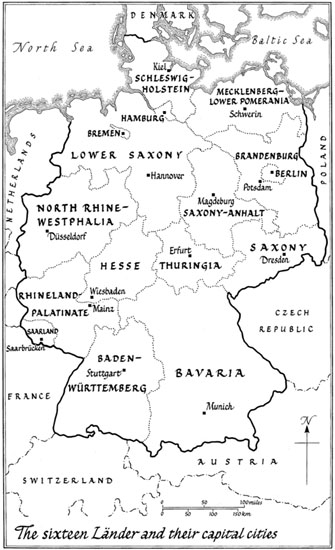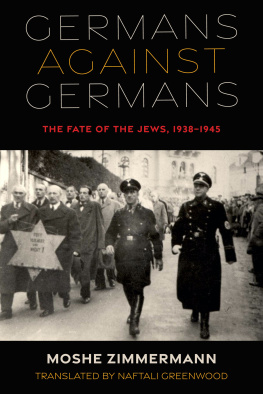GERMANIA
Also by Simon Winder
The Man Who Saved Britain
AS EDITOR
Night Thoughts
Sea Longing
The Feast
My Names Bond...
Simon Winder
GERMANIA
In Wayward Pursuit of the Germans and Their History

FARRAR, STRAUS AND GIROUX
NEW YORK
Farrar, Straus and Giroux
18 West 18th Street, New York 10011
Copyright 2010 by Simon Winder
All rights reserved
Printed in the United States of America
Originally published in 2010 by Picador,
an imprint of Pan Macmillan Ltd., Great Britain
Published in the United States by Farrar, Straus and Giroux
First American edition, 2010
Library of Congress Cataloging-in-Publication Data
Winder, Simon.
Germania : in wayward pursuit of the Germans and their history / Simon Winder.1st ed.
p. cm.
Includes bibliographical references and index.
ISBN 978-0-374-25400-1 (hardcover : alk. paper)
1. GermanyCivilization. 2. National characteristics, German. I. Title.
DD61.W545 2010
943dc22
2009045651
www.fsgbooks.com
1 3 5 7 9 10 8 6 4 2
For Felix
What things there are to see, if we can only get away from our own fireside!
Joseph von Eichendorff, Life of a Good-for-Nothing
Watch out! Historical steps!
Sign on a slightly uneven staircase at Luthers birthplace in Eisleben
Contents


Introduction
Bound with chains of flowers
I have spent many years chewing over German history and this book is an entirely personal response to it. Dozens of visits to Germany and Austria form the core of Germania. It is an attempt to tell the story of the Germans starting from their notional origins in the sort of forests enjoyed by gnomes and heroes and ending at the time of Hitlers seizure of power, by way of my own thoughts about what I have seen, read and found interesting. Of course people travel for different reasons and what I find bewitching someone else may well find stupefying. If, for some, travel is a chance to admire Counter-Reformation altarpieces and for others a chance for a one-on-one roughhouse with a Dortmund transsexual, then these are possibly irreconcilable priorities although they could intersect in some of the less bustling regional museums. It is therefore built into this book that I will bore or alienate some readers but I hope not too many. Germania is designed to be an entertainment although I hope the implications of some of what I am saying are reasonably thought-provoking.
Germany is a sort of Dead Zone today. Its English-speaking visitors tend to be those with professional reasons for being there soldiers, historians, builders. One of the amusements at Frankfurt airport is seeing baffled little clumps of British recent ex-students in special dark suits waiting for planes given jobs by German banks purely because they are part of, in evolutionary terms, an alarmingly un-diverse band who had happened to study German at university, their career choice based on a facility with languages rather than being able to, say, count, flatter clients or take smart decisions.
Germany is shunned for a very good reason the enormity of its actions in part of the last century. But is there perhaps a point when this quarantine becomes too mutilating to Europes culture, when in effect it allows Hitlers estimation of his own country to prevail? This book is, of course, soaked in the disaster of the Third Reich, but by beginning in those ancient forests and ending when he seizes power in 1933, I want to get round the Fhrer and try to reclaim a bit of Europe which is in many ways Britains weird twin, and which for almost all of its history has been no less attractive and no more or less admirable than many other countries. Germany is a place without which European culture makes no sense, and for over sixty years Germans have been working strenuously to rebuild that culture in a way that, while admitting the legacy of the Third Reich, allows that earlier past to shine again.
The book is in chronological order, although the Roman and medieval bits veer around alarmingly and are as much about why later Germans were so obsessed with these periods as they are about the periods themselves. Every attempt has been made to avoid a mere sequence of dreary dynastic events. The chronology is less oppressive than it might be because I take regular time-outs to talk about music, fairy tales, alcohol and so on. But where did this interest come from?
Some families relish action and adventure, others are perhaps more passive. Growing up, I like all children assumed that my own family was just like any other that we in fact provided a benchmark by which other families were more rambunctious than ourselves or more snobbish or more gloomy. Looking back from the slightly more comparative heights of adulthood, my family (myself included) now strike me as almost crazily inert. Months would go by with effectively no form of activity whatsoever. We would engage in a restricted range of household chores, but otherwise my parents and my younger sisters and I lived, in our west Kent idyll, in a sort of enchanted castle of torpor. My mother disapproved of any form of exercise so we had no bicycles and, despite having a large garden, I had a clear sense that it was probably a mistake to go outside at all, with its lack of comfortable chairs and reading lamps. Occasionally my father would battle to mow the moss-clogged lawn, but I certainly never volunteered to help and the garden always won. Once a summer we would stir ourselves sufficiently to have lunch outside, but my sisters and I would take turns to be alarmed by wasps, something would always get spilled and the conversation would tend to veer acrimoniously in wrong directions. My hatred for all forms of sport stemming of course from incompetence put the final lid on. While we were busy in the usual ways during the school term, the weekends and holidays seemed to drift by in a genial slough of inaction. This background is necessary to understand the sheer drama and excitement of my first encounter with Germanness, the unintended pivot that changed the direction of my life.
Looking back I think my father was a little frustrated by the general housebound stasis. He liked to do DIY and had run and fenced at school. His one great surprise was that he was in the Royal Naval Reserve. This was a commitment he began shortly before meeting my mother and she always hated it as it meant that for two weeks of the year he would disappear with an irritating combination of nonchalance and patriotism, while she had to deal with a pile of needy if unvigorous children. How I loved his annual trip. He would go on nuclear submarines, minesweepers, aircraft carriers (the Ark Royal!), fly as a passenger in Phantom fighter-bombers. Clearly the whole thing was a laugh, and because the Cold War never went anywhere, it simply became a government-paid-for way to eat huge fatty breakfasts, wear a devastatingly lovely uniform, drink a lot and fire guns. He wound up with the James Bond rank of commander, with a gorgeous peaked cap and a jacket festooned at the cuff with the sort of gold-stitching that makes fighting wars almost worthwhile. He would send me occasional, curtly mysterious postcards with suitable pictures of jets and missiles and stuff, which gave me a cumulative, phony credibility at my boarding school.
Next page








